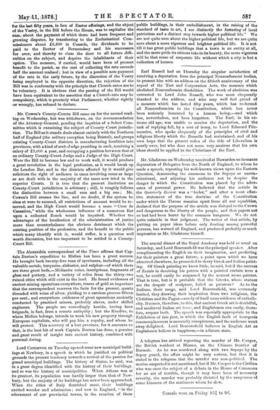The annual dinner of the Royal Academy was held as
usual on Saturday, and Lord Beaconsfield was the principal speaker. After complimenting the English on their imagination, and predicting for their painters a great future, a point upon which we have observed elsewhere, he proceeded to decry Greek and Italian paint- ing. Of Greek painting we know little, he said, but if the success of Zeuxis in deceiving his patron with a painted curtain were a test, he could easily be surpassed by the nearest scene-painter. That is true, but is it probable that the Greeks, whose statues are the despair of sculptors, failed as painters ? As to the Italians, their range, said Lord Beaconsfield, was extremely limited, they drawing their inspiration from two religions, the Christian and the Pagan—surely of itself some evidence of catholi- city. It comes, therefore, to this, that ancient Greek art is doubtful, and mediwval Italian art Loral:, and Englishmen can easily, there- fore, surpass both. The speech was especially appropriate to the Exhibition of this Year, in which the English fault of bourgeois commonplaceness is unusually conspicuous, and the audience went away delighted. Lord Beaconsfield believes in English Art as Englishmen believe in happiness,—in a future state.






































 Previous page
Previous page